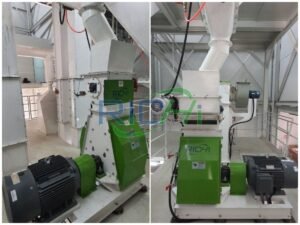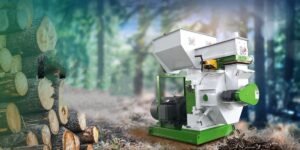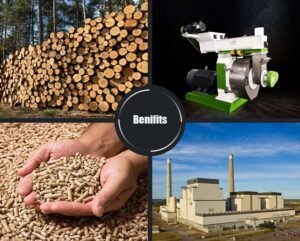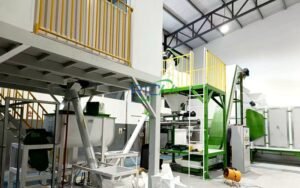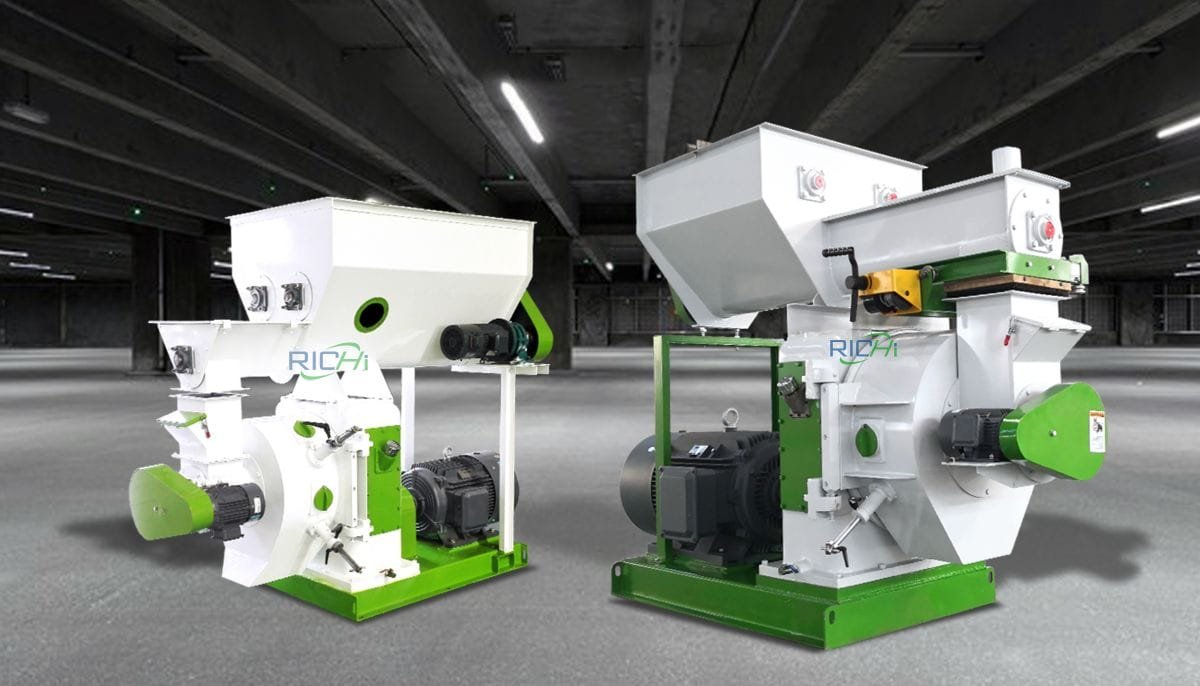
Wood pellet maker machines are essential in the biomass industry, converting raw materials into high-density pellets utilized for energy generation, animal bedding, and various other applications. The performance and efficiency of these machines depend significantly on their design and functionality. This article provides an overview of the different types of wood pellet maker machines, highlighting their features and applications to help potential users make informed decisions based on their specific requirements.
1. Flat Die Pellet Mill
The flat die pellet mill is among the most widely used wood pellet machines, especially favored for small-scale production.
- Design and Functionality: In a flat die pellet mill, the die is oriented horizontally, with raw materials fed into the mill from above. The machine comprises a flat die with holes and rollers that compress the raw materials into pellets as they pass through the die. The pellets are then cut to the desired length upon exiting the die.
- Types: There are two primary types of flat die pellet mills based on their rotation style:
- D-type (Die-turned): In this configuration, the die rotates while the rollers remain stationary, typically resulting in more efficient production of high-quality pellets.
- R-type (Roller-turned): Here, the rollers rotate around the die, making this design more compact and user-friendly, ideal for home use and small-scale production.
- Applications: Flat die pellet mills are suitable for producing animal feed, biomass pellets, and wood pellets. They are commonly used by small farms, home users, and startups due to their affordability and ease of operation.

2. Ring Die Pellet Mill
The ring die pellet mill is engineered for large-scale production and is frequently used in commercial and industrial settings.
- Design and Functionality: In a ring die pellet mill, the die is vertically positioned, with raw materials fed into the center of the die. Rollers compress the materials against the die, forcing them through the holes to form pellets. This design allows for continuous operation and higher production capacities.
- Types: Ring die pellet mills can be classified into two categories based on their feeding mechanisms:
- Horizontal Ring Die Pellet Mill: This type utilizes a mechanically forced feed system, ensuring a consistent supply of raw materials to the die.
- Vertical Ring Die Pellet Mill: This design relies on the raw materials’ self-weight for feeding, making it suitable for applications where gravity can assist in the feeding process.
- Applications: Ring die pellet mills excel in producing wood pellets, biomass fuel, and animal feed on a large scale. They are often used in commercial pellet production facilities due to their high efficiency and output capacities, which can range from 200 kg/h to several tons per hour.
3. Mobile Pellet Mill
Mobile pellet mills are portable machines designed for on-site wood pellet production.
- Design and Functionality: Equipped with wheels or tracks, these machines can be easily transported to various locations. Mobile pellet mills can be powered by diverse sources, including electric motors, diesel engines, or PTO (Power Take-Off) systems.
- Applications: Mobile pellet mills are particularly advantageous for farmers or businesses requiring flexibility in their production process. They enable the production of pellets directly from raw materials on-site, reducing transportation costs and ensuring freshness. This type of machine is also beneficial for small-scale operations, such as farms producing their own feed.
4. Industrial Pellet Mill
Industrial pellet mills are robust machines designed for high-capacity production in large-scale operations.
- Design and Functionality: These machines are constructed with durable materials and advanced technology to endure continuous operation under high pressure and temperature. Industrial pellet mills often incorporate sophisticated control systems for precise monitoring and adjustments during the production process.
- Applications: Industrial pellet mills are utilized in large pellet production facilities, power plants, and biomass processing plants. They can produce high-quality pellets at a rapid pace, making them suitable for fulfilling the demands of large markets.
5. Biomass Pellet Mill
Biomass pellet mills are specifically designed to process a diverse range of biomass materials, including wood, agricultural residues, and other organic matter.
- Design and Functionality: These machines can handle various feedstocks, providing versatility for different applications. Biomass pellet mills often feature adjustable die sizes and roller configurations to accommodate different raw materials.
- Applications: Biomass pellet mills are employed in producing biomass fuel pellets for heating and energy generation. They are also suitable for creating animal bedding and organic fertilizers, contributing to sustainable agricultural practices.
6. Custom Pellet Mill
Custom pellet mills are tailored to meet the unique needs of individual users or businesses.
- Design and Functionality: These machines can be customized with specific features such as unique die sizes, additional conditioning systems, or specialized feeding mechanisms to meet particular production requirements.
- Applications: Custom pellet mills are ideal for businesses with unique raw materials or specific production goals. They provide flexibility and efficiency, enabling producers to optimize their pellet production process according to their individual needs.
Conclusion
Wood pellet maker machines come in various types, each designed to cater to specific production needs and capacities. From flat die and ring die pellet mills to mobile and industrial models, the selection of the machine depends on factors such as production scale, type of raw material, and intended application.
Understanding the different types of wood pellet machines is crucial for producers looking to optimize their operations and meet the increasing demand for renewable energy sources and sustainable practices. By selecting the right machine for their requirements, businesses can enhance production efficiency, reduce costs, and contribute to a more sustainable future in the biomass industry. As the demand for wood pellets continues to grow, investing in the appropriate wood pellet maker machine will be essential for success in this competitive market.
